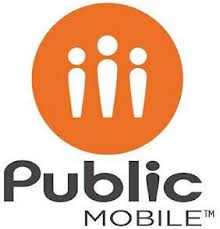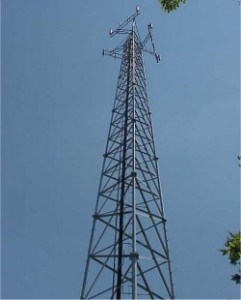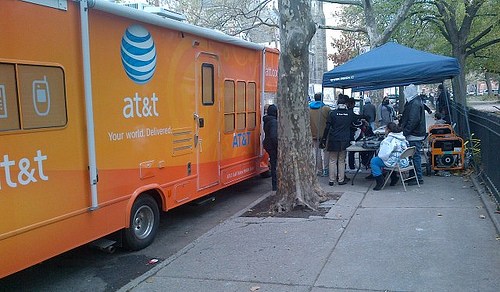
The Kansas House of Representatives voted 118-1 to pass a bill they admit was written and pushed by the largest telecom companies in the state. The chief supporters all received campaign contributions from AT&T and other telecom interests.
Kansas’ House of Representatives voted 118-1 Monday to support a bill largely crafted by AT&T that will let the state’s largest phone company discontinue service at-will in rural areas of the state.
H.B. 2201 had near-universal support from legislators that openly admitted the legislation was conceived and written by the state’s largest telecommunications companies, chiefly AT&T, and grants the phone companies a third round of deregulation.
The legislation is expected to sail through the Kansas Senate with bipartisan support and Republican Gov. Sam Brownback, who generally favors telecom deregulation, is likely to sign it.
The legislation was originally pushed as a money-saver for Kansas ratepayers. The bill calls for a major reduction in funding requirements for the Kansas Universal Service Fund (KUSF), which subsidizes rural telecommunications services in the state. The KUSF is principally funded through a surcharge found on customer bills. Under the terms of the bill, funding requirements will be drastically reduced, cutting the surcharge in the process.
The Kansas Citizens’ Utility Ratepayer Board testified if H.B. 2201 only contained KUSF reform, the group would have supported the measure. But the bill also has a myriad of deregulation measures that received little apparent attention by legislators:
- H.B. 2201 eliminates quality of service requirements. AT&T and other phone companies can deliver any level of phone service they choose with no oversight and nobody to answer to;
- Allows price discrimination based on geographic location, which could mean substantially higher phone rates in rural areas, especially for nearby toll calls;
- Allows telecom companies to exit the Lifeline program for inexpensive service for the poorest Kansans after 90 days written notice;
- Removes AT&T and other phone companies as “carriers of last resort,” which means they are no longer required to provide phone service upon request.
The elimination of the “carrier of last resort” provision is essential to AT&T’s plans to abandon rural landline service, forcing customers to buy substantially more expensive cellular phone and data service. With the passage of H.B. 2201, AT&T can notify rural Kansas customers it will drop their landline service and/or broadband at-will.

Siewert
The single “no” vote came from freshman Rep. Larry Hibbard, (R-Toronto), who noted landline service was essential in many rural areas. Hibbard worried AT&T would use the legislation as an excuse to raise rates or force elderly Kansans to use a wireless cell phone, which could prove too confusing for them.
“This bill may come back to haunt rural Kansas,” Hibbard warned.
“We have this mentality, ‘if I don’t have a wire, I can’t make a phone call.’ That’s not true,” countered Rep. Scott Schwab, an Olathe Republican who supports the bill. “That copper line is being replaced with an antenna, and it’s more reliable.
“We are not killing Lifeline,” Schwab added. “We are just not mandating it.”
Other supporters were far more sanguine, even disclosing the substantial role telecom companies had getting the legislation written and shepherded through the House.
“This was an industry bill that they all worked very hard” to put together, admitted Rep. Joe Seiwert (R-Pretty Prairie) during a House Republican caucus meeting. “[This bill] puts legislators in an easier position of not having to ‘choose between friends.'”

Kuether
Seiwert, for example, did not have to disappoint his largest campaign contributor — AT&T — or others who donated to his campaign, including the Koch Brothers, Cox Communications, CenturyLink, Verizon, and the Kansas cable lobby.
Rep. Annie Kuether of Topeka, who is the ranking Democrat on the Utilities and Telecommunications Committee, also supported the bill. Kuether is the recipient of campaign contributions from AT&T, Cox Cable, Time Warner Cable, Kansas cable and telephone company PAC groups, and more than a dozen independent telecommunications providers doing business in Kansas.
For ordinary Kansans, the bill does not assure savings, and could lead to dramatic price increases, especially in rural areas forced to pay for cell service. The measure also eliminates the Kansas Corporation Commission as a last resort for customers with service problems that go unresolved. Those customers would be on their own after the bill becomes law.
Legislators did not see any incompatibility between the proposed bill and Kansas state policy, set forth in Statute 66-2001:
It is hereby declared to be the public policy of the state to:
(a) Ensure that every Kansan will have access to a first class telecommunications infrastructure that provides excellent services at an affordable price;
(b) ensure that consumers throughout the state realize the benefits of competition through increased services and improved telecommunications facilities and infrastructure at reduced rates;
(c) promote consumer access to a full range of telecommunications services, including advanced telecommunications services that are comparable in urban and rural areas throughout the state;
(d) advance the development of a statewide telecommunications infrastructure that is capable of supporting applications, such as public safety, telemedicine, services for persons with special needs, distance learning, public library services, access to internet providers and others; and
(e) protect consumers of telecommunications services from fraudulent business practices and practices that are inconsistent with the public interest, convenience and necessity.
The Associated Press notes this is AT&T’s third trip through the state legislature to win deregulation. A 2006 state law deregulated prices for bundles of services that included wireless, Internet access, cable TV or other video and moved toward deregulating rates for local service in exchanges where competition existed. A 2011 law went further, allowing companies to avoid most state price caps. This year’s bill would allow those companies to avoid even the Kansas Corporation Commission’s consumer protection regulations and minimum quality-of-service standards.
 Canada’s three major independent wireless companies have resigned from the Canadian Wireless Telecommunications Association after claiming the group maintained a consistent bias in favor of the three largest carriers in the country.
Canada’s three major independent wireless companies have resigned from the Canadian Wireless Telecommunications Association after claiming the group maintained a consistent bias in favor of the three largest carriers in the country. “We have spent the better part of three years repeatedly voicing our opposition to the CWTA on a wide range of matters to the point of issuing a press release in January 2011 that publicly expressed our dissent on the CWTA’s position on wireless consumer protection,” added Gary Wong, director of legal affairs for Mobilicity. “There seems to be a blatant disregard of the new entrants in favor of acting in the best interests of the big three carriers, and it is unacceptable.”
“We have spent the better part of three years repeatedly voicing our opposition to the CWTA on a wide range of matters to the point of issuing a press release in January 2011 that publicly expressed our dissent on the CWTA’s position on wireless consumer protection,” added Gary Wong, director of legal affairs for Mobilicity. “There seems to be a blatant disregard of the new entrants in favor of acting in the best interests of the big three carriers, and it is unacceptable.”

 Subscribe
Subscribe


 Russian state-controlled telecom operator Rostelecom has announced it is refocusing most of its capital investment on broadband expansion, after the Russian government called on providers to build out Russia’s broadband infrastructure.
Russian state-controlled telecom operator Rostelecom has announced it is refocusing most of its capital investment on broadband expansion, after the Russian government called on providers to build out Russia’s broadband infrastructure.


